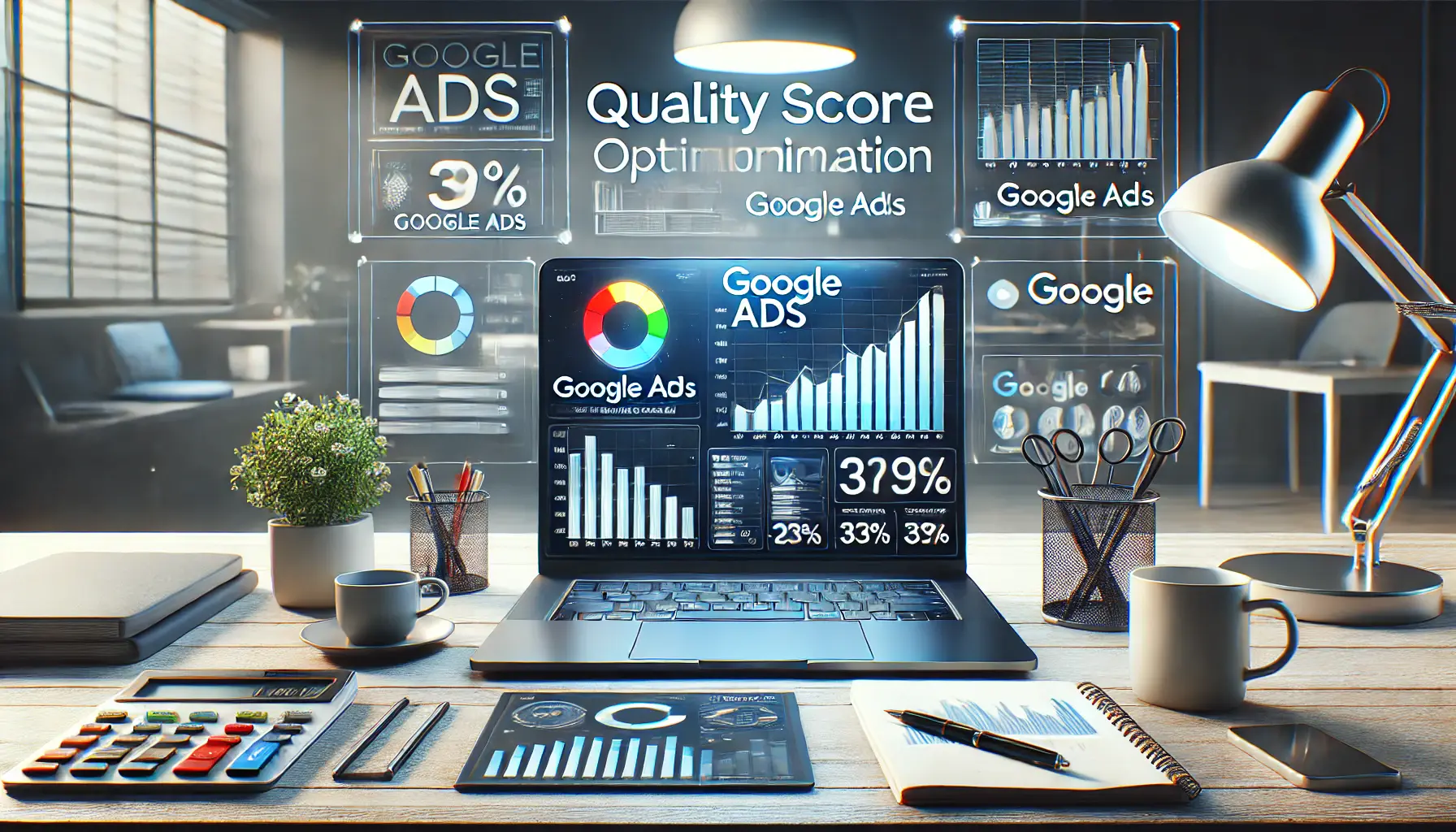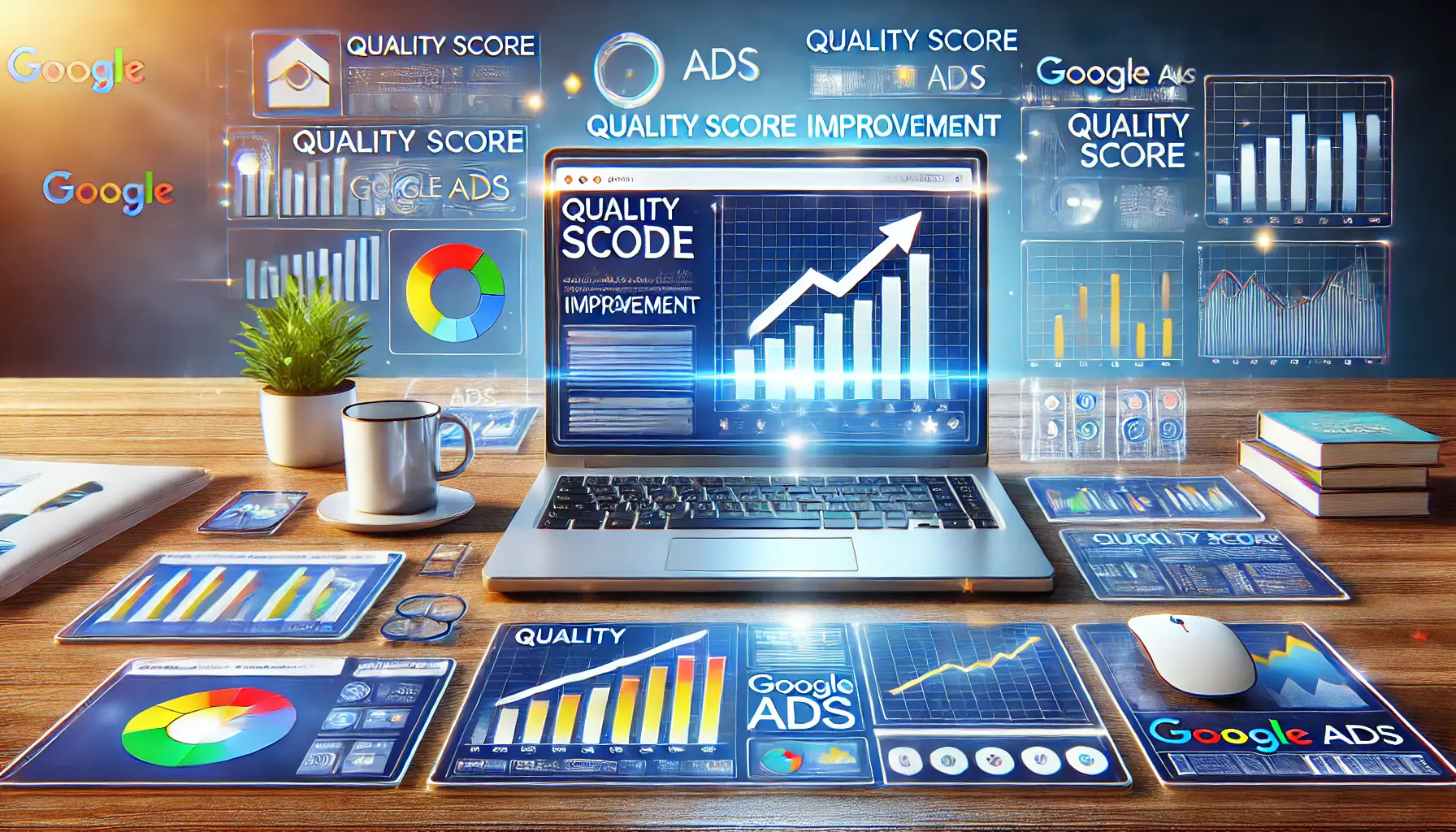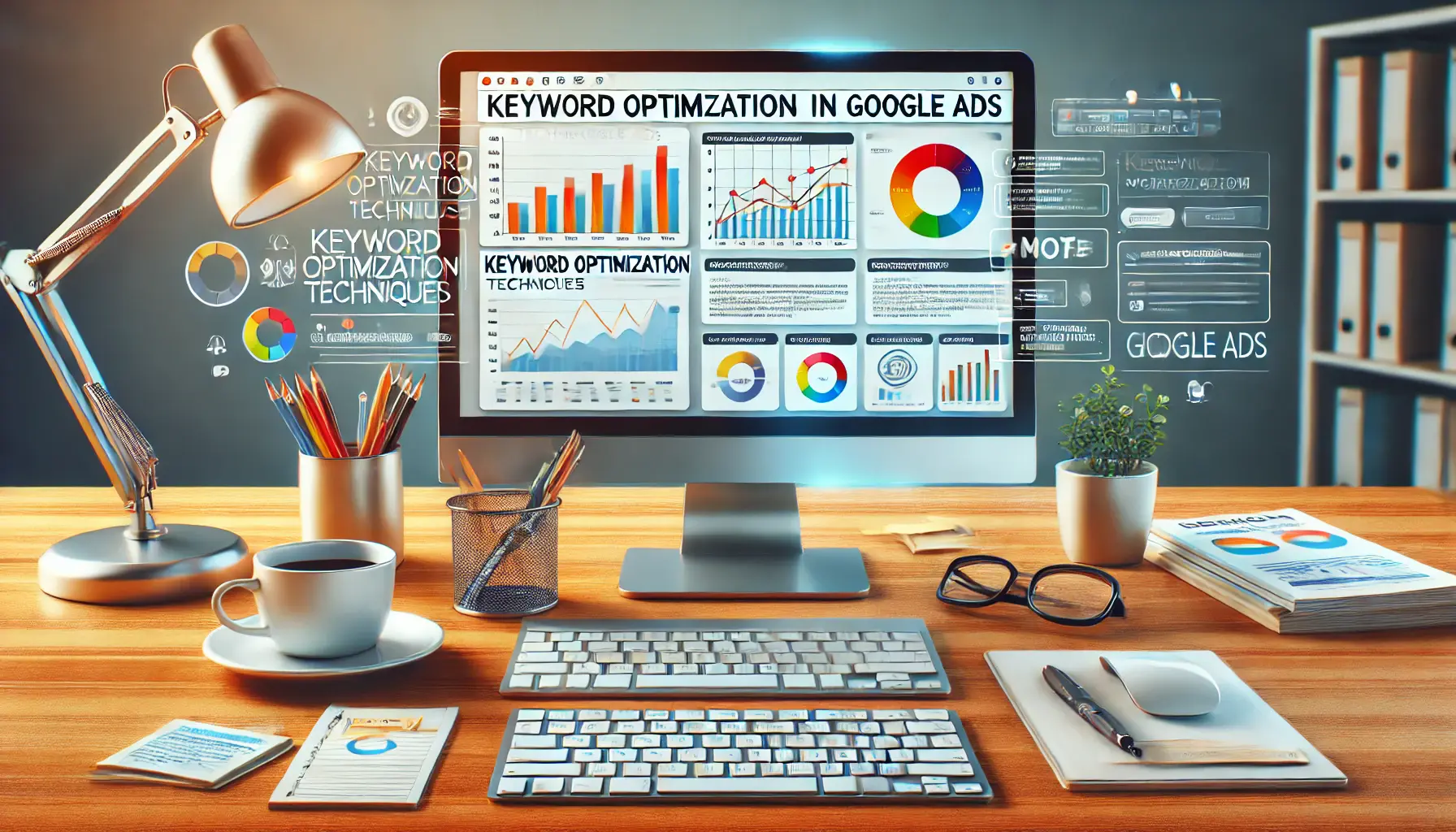In the cutthroat world of digital advertising, being at the head of the class involves more than just a great product or service.
In the realm of Google Ads, success largely centers on one factor: having—and keeping—a high Optimization Score.
Not only does it provide a general sense of your campaigns’ health, but it also pinpoints areas you need to optimize for the best performance.
Whether you’re an experienced advertiser or new to the platform, knowing how to improve your Optimization Score is key for better ad spend and yielding a higher return among desired audiences.
In this article, we dive into actionable strategies and takeaways to set up your Google Ads campaigns for a good Optimization Score.
By the end, you’ll have a clear roadmap to enhance your campaigns and get the most out of your advertising efforts.
- Understanding Google Ads Optimization Score
- Strategies to Improve Your Optimization Score
- Common Challenges in Achieving a Good Optimization Score
- Tools and Features to Monitor and Improve Optimization Score
- Best Practices for Maintaining a High Optimization Score
- Conclusion: Mastering the Art of a High Optimization Score
- Google Ads Optimization Score: FAQs and Quick Answers
Understanding Google Ads Optimization Score
The Optimization Score is a metric provided by Google Ads to give advertisers a quick snapshot of how well their campaigns are performing.
Ranging from 0% to 100%, this score is calculated based on the implementation of Google’s recommendations and other performance indicators.

A representation of the Google Ads Optimization Score concept, focusing on performance and optimization.
What is the Optimization Score?
Simply put, the Optimization Score measures how effectively your campaigns align with Google’s best practices.
It serves as a guideline to help you understand what adjustments can be made to improve performance.
A higher score indicates that your campaigns are well-optimized, while a lower score suggests there are areas for improvement.

Visualizing the process: A representation of the calculation behind the Google Ads Optimization Score.
How is the Optimization Score Calculated?
Google Ads uses a combination of factors to calculate the Optimization Score, including:
- The adoption of recommended changes, such as keyword adjustments or bid strategy updates.
- Historical performance data from your campaigns.
- Relevance and quality of your ad creatives and keywords.
- Targeting settings, including audience and geographic parameters.
Each recommendation comes with a potential score improvement, and implementing these suggestions can boost your overall Optimization Score.

Understanding the impact: A business professional reviewing key metrics on a Google Ads dashboard to improve campaign performance.
Why is Optimization Score Important for Advertisers?
Your Optimization Score acts as a performance health check for your campaigns.
Here’s why it matters:
- Improved ROI: By following Google’s recommendations, you can make the most out of your ad budget.
- Better Ad Placement: Higher scores often result in better ad rankings, leading to more visibility.
- Increased Efficiency: The score highlights specific areas that need attention, saving you time on guesswork.
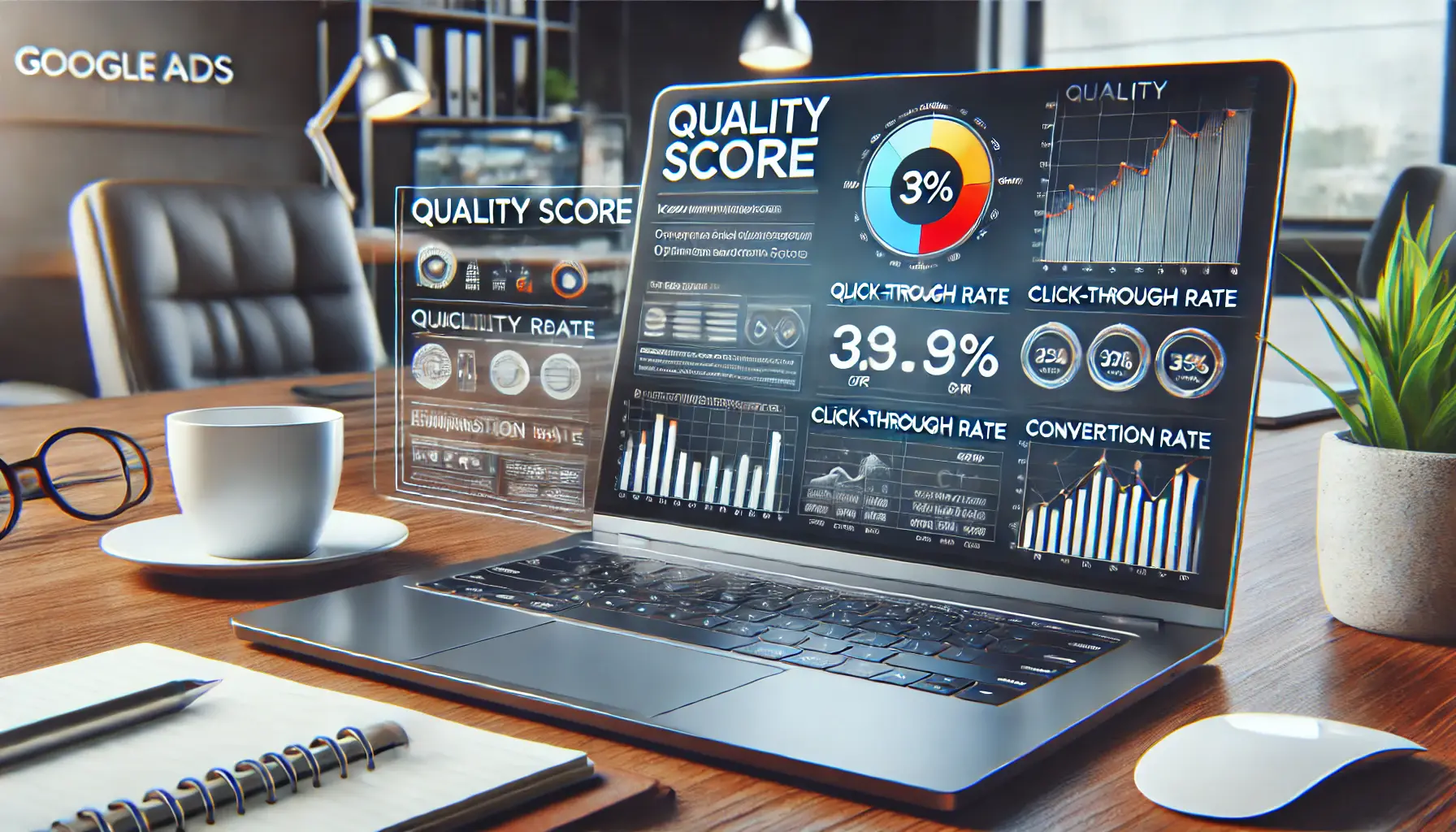
Visualizing key metrics: A laptop screen displaying important performance metrics that influence the Google Ads Optimization Score.
Key Metrics That Influence the Optimization Score
Several metrics play a role in determining your Optimization Score.
These include:
- Quality Score: The relevance and quality of your keywords, ads, and landing pages.
- Click-Through Rate (CTR): How often users click on your ad after seeing it.
- Conversion Rate: The percentage of users who complete desired actions after clicking your ad.
- Budget Utilization: Ensuring your campaigns stay within budget while achieving optimal results.
By focusing on these metrics and implementing Google’s recommendations, you can steadily improve your Optimization Score and achieve greater success with your campaigns.
The Optimization Score is a critical metric for assessing the health of your Google Ads campaigns and identifying areas for improvement. Focus on aligning campaigns with best practices for maximum performance.

Analyzing strategies: A business professional reviewing data to improve Google Ads Optimization Score through strategic adjustments.
Strategies to Improve Your Optimization Score
Enhancing your Optimization Score in Google Ads is essential for maximizing campaign performance.
By implementing effective strategies, you can ensure your ads reach the right audience and achieve your marketing goals.
Here are some actionable steps to consider:

Collaborating for quality: A team working together to create visually appealing and engaging ad content for Google Ads.
Ensuring High-Quality Ad Content
Creating compelling and relevant ad content is crucial.
Your ads should resonate with your target audience and encourage engagement.
- Ad Relevance: Match your ad copy closely with the targeted keywords. This alignment will boost CTR and lead to more clicks.
- Clear Call-to-Action: Provide a clear call-to-action to guide users to the next step, such as “Shop Now” or “Learn More.”
- Ad Extensions: Utilize ad extensions to provide additional information and extend the visibility of your ads. Use options like site links, callouts, and structured snippets to enhance performance.

Optimizing performance: A business professional using smart bidding strategies to manage Google Ads campaigns.
Leverage Smart Bidding Strategies
Automated bidding strategies optimize your bids in real time to achieve your desired business outcomes.
Consider these approaches:
- Target ROAS (Return on Ad Spend): Bids are optimized to maximize conversion value while achieving a specific target return on ad spend.
- Maximize Conversions: Automatically sets bids to get the most conversions within your budget.

Strategic targeting: A business professional fine-tuning audience, geographic, and device targeting settings to improve ad campaign performance.
Optimize Targeting Settings for Better Performance
Refining your targeting settings ensures your ads are shown to the most relevant audience.
- Audience Segmentation: Define and target specific audience segments based on demographics, interests, and behaviors.
- Geographic Targeting: Focus your ads on locations where your potential customers are located to enhance relevance and performance.
- Device Targeting: Adjust bids based on device performance to ensure optimal engagement across desktops, tablets, and mobile devices.
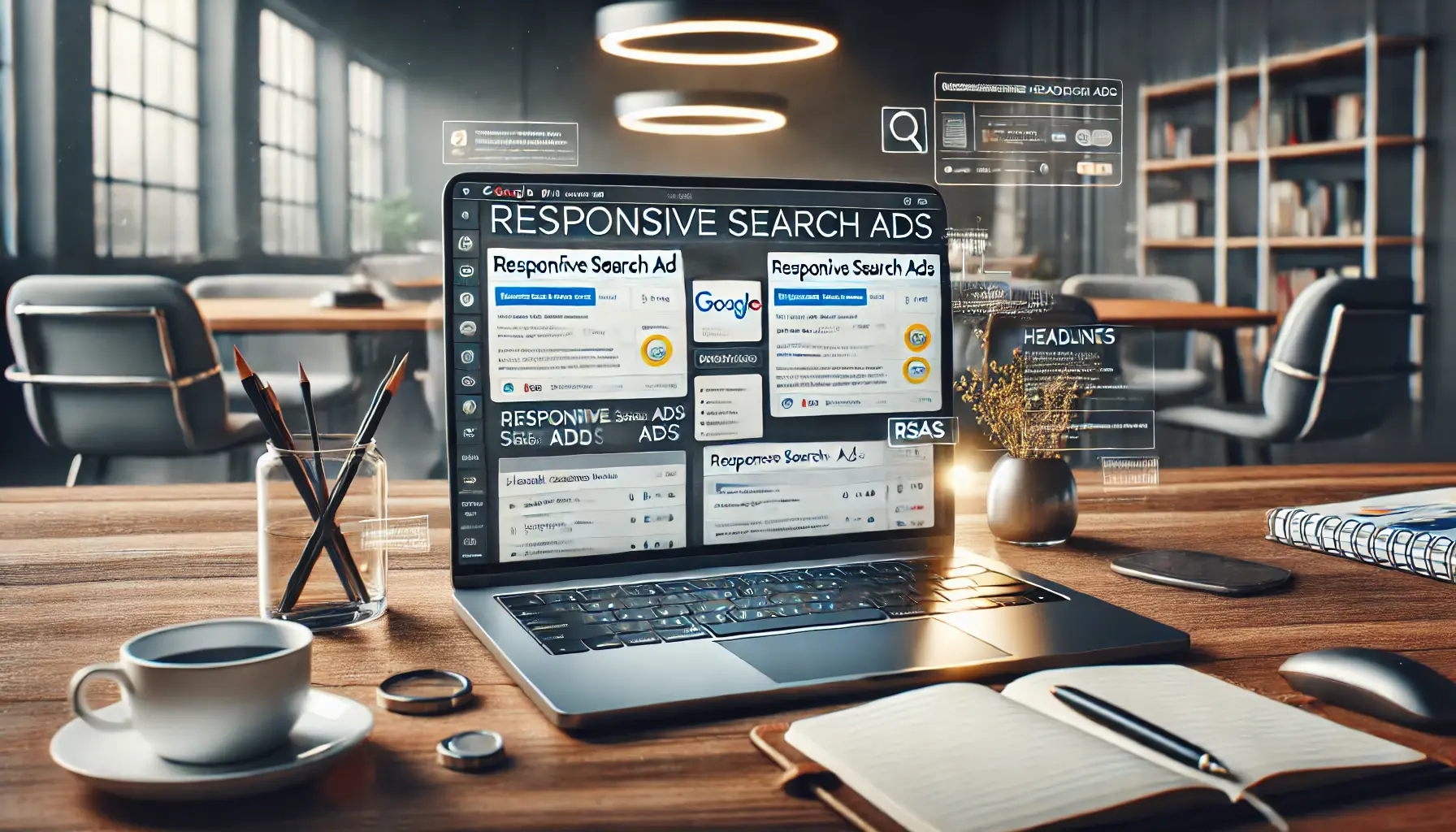
Testing and optimizing: A digital workspace where multiple headline and description combinations are being tested for responsive search ads in Google Ads.
How to Effectively Leverage Responsive Search Ads
Responsive Search Ads (RSAs) adapt to show more text and the most relevant messages to your customers.
Follow these best practices:
- Multiple Headlines and Descriptions: Provide multiple headlines and descriptions for a single ad. Google Ads will test various combinations to identify the best performers.
- Keyword Inclusion: Incorporate relevant keywords in your headlines and descriptions to improve ad relevance.
- Monitor Performance: Regularly review asset performance ratings to identify and replace low-performing ad copy.
By focusing on these strategies, you can maintain a high Optimization Score, improve ad performance, and achieve a better return on investment.
Implement actionable strategies like creating high-quality ad content, leveraging smart bidding, and optimizing targeting to achieve a high Optimization Score and improve ROI.
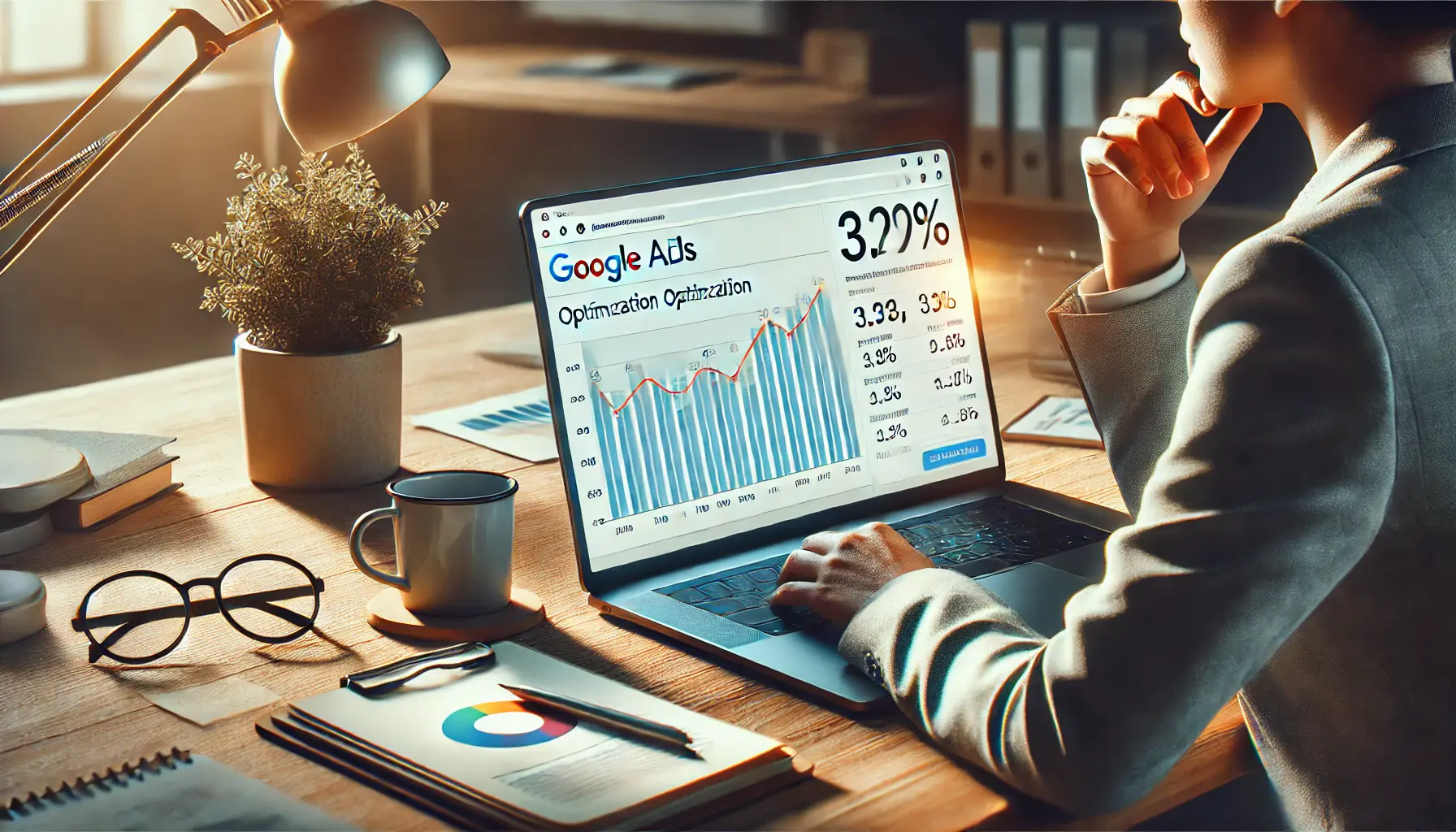
Overcoming obstacles: A business professional analyzing performance metrics and optimization challenges on a Google Ads dashboard.
Common Challenges in Achieving a Good Optimization Score
Improving your Optimization Score in Google Ads can be a complex task, often accompanied by several challenges.
Understanding these obstacles is crucial for effective campaign management and achieving optimal performance.
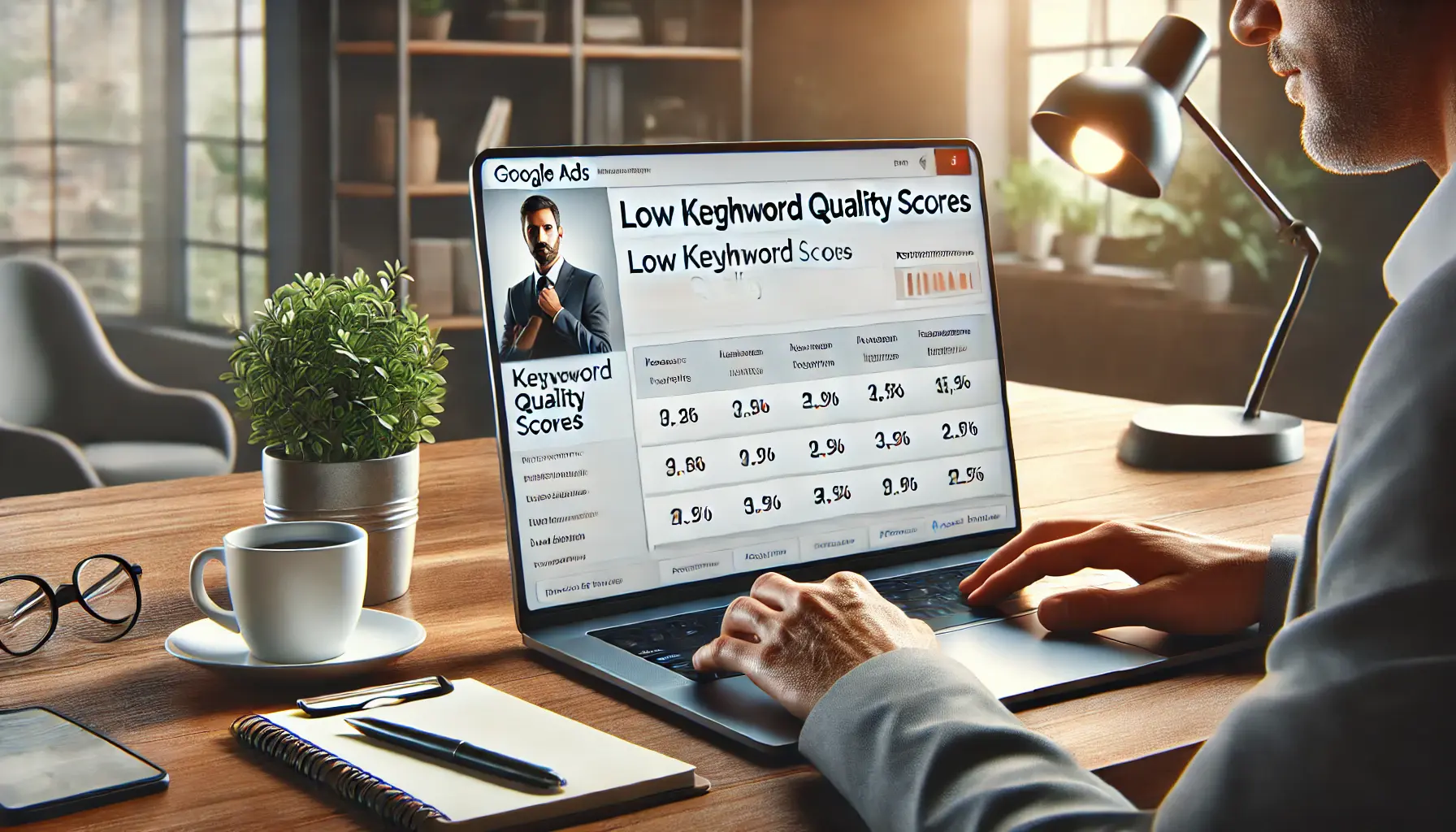
Improving keyword quality: A business professional analyzing low keyword quality scores and considering optimization strategies.
Addressing Low Keyword Quality Scores
A low Quality ScoreA Google Ads metric that measures the relevance and quality of your keywords, ads, and landing pages. can significantly impact your optimization efforts.
This score reflects the relevance and quality of your keywords, ads, and landing pages.
- Keyword Relevance: Ensure your keywords are highly relevant to the search queries of your target audience to improve performance.
- Ad Copy Quality: Create compelling ad copies that align with user intent and incorporate targeted keywords.
- Landing Page Experience: Optimize your landing pages to be relevant, fast-loading, and user-friendly to boost Quality Scores.

Managing resources: A business professional evaluating ad spend and budget allocation strategies in Google Ads.
Effectively Managing Budget and Ad Spend
Efficient budget management is essential for maintaining a high Optimization Score.
Overspending or underspending can adversely affect campaign performance.
- Budget Allocation: Strategically distribute your budget across campaigns to maximize ROI.
- Bid Strategies: Use bidding strategies like Target CPA or Maximize Conversions to align with your campaign goals.
- Performance Monitoring: Regularly review spending patterns and adjust budgets based on campaign performance data.
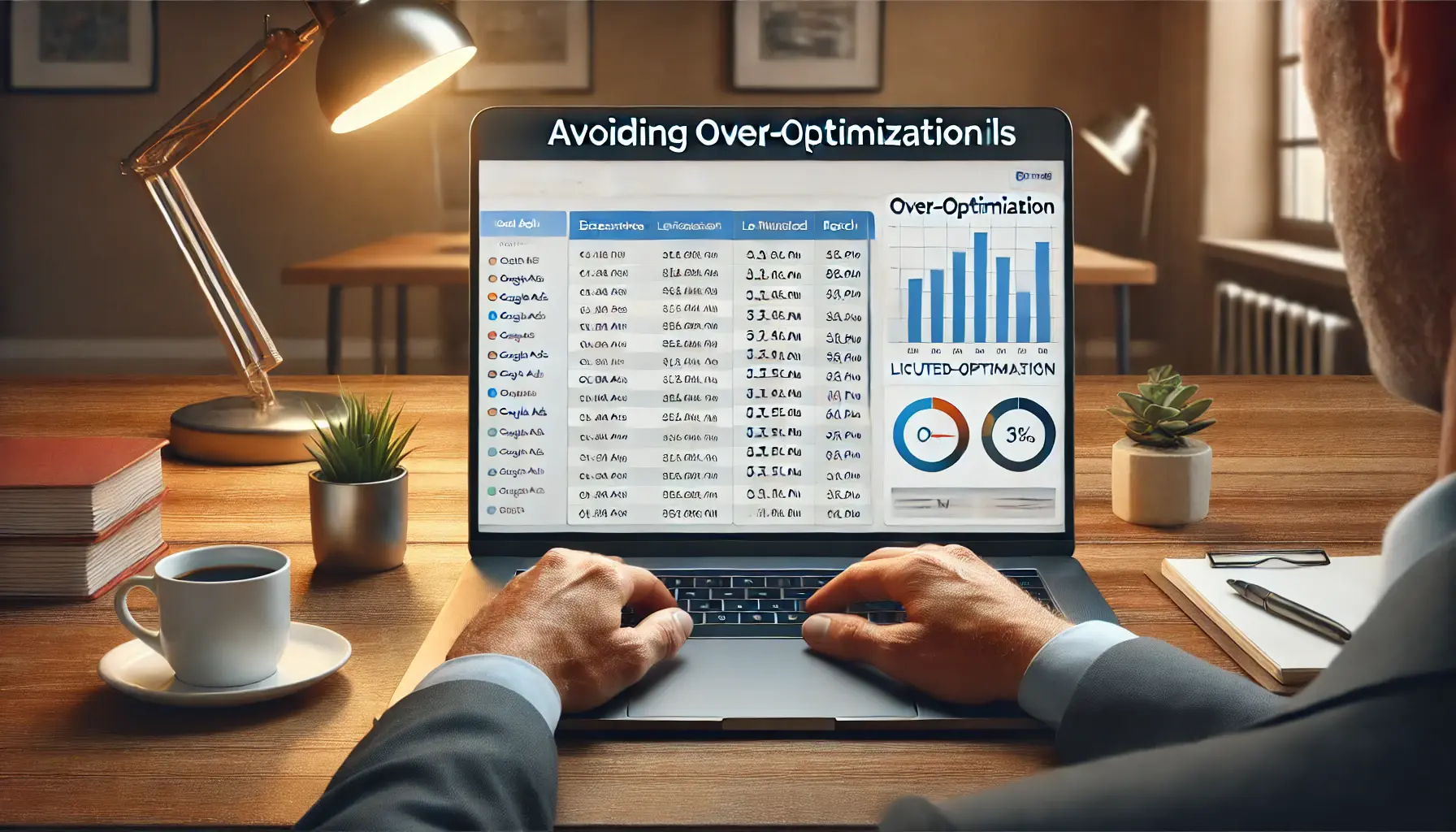
Balancing optimization: A business professional analyzing the risks of over-optimization in Google Ads.
Avoiding Over-Optimization Pitfalls
While optimization is crucial, over-optimization can lead to diminishing returns and negatively impact campaign performance.
- Excessive Keyword Refinement: Over-segmentation of keywords can limit reach and reduce ad visibility.
- Frequent Ad Changes: Constant changes to ad copy may prevent accurate performance assessment.
- Rigid Automation Reliance: Over-dependence on automated recommendations without considering campaign context can lead to suboptimal results.

Adapting to change: A business professional reviewing seasonal and industry trends in Google Ads to optimize ad performance.
Handling Seasonal and Industry Trends
Seasonal fluctuations and industry trends can make it challenging to maintain a consistent Optimization Score.
- Seasonal Campaign Adjustments: Align your campaigns with seasonal demand fluctuations to ensure they remain relevant and engaging.
- Trend Analysis: Monitor industry trends to stay ahead of market fluctuations and adjust your advertising strategies accordingly.
- Flexible Budgeting: Dynamically allocate budgets to capitalize on peak periods and conserve resources during low-demand phases.
By understanding and addressing these challenges, you can improve your Optimization Score and run smoother, more effective Google Ads campaigns.
Be mindful of challenges such as low keyword quality scores, improper budget management, and over-optimization, as they can negatively impact your campaign performance.
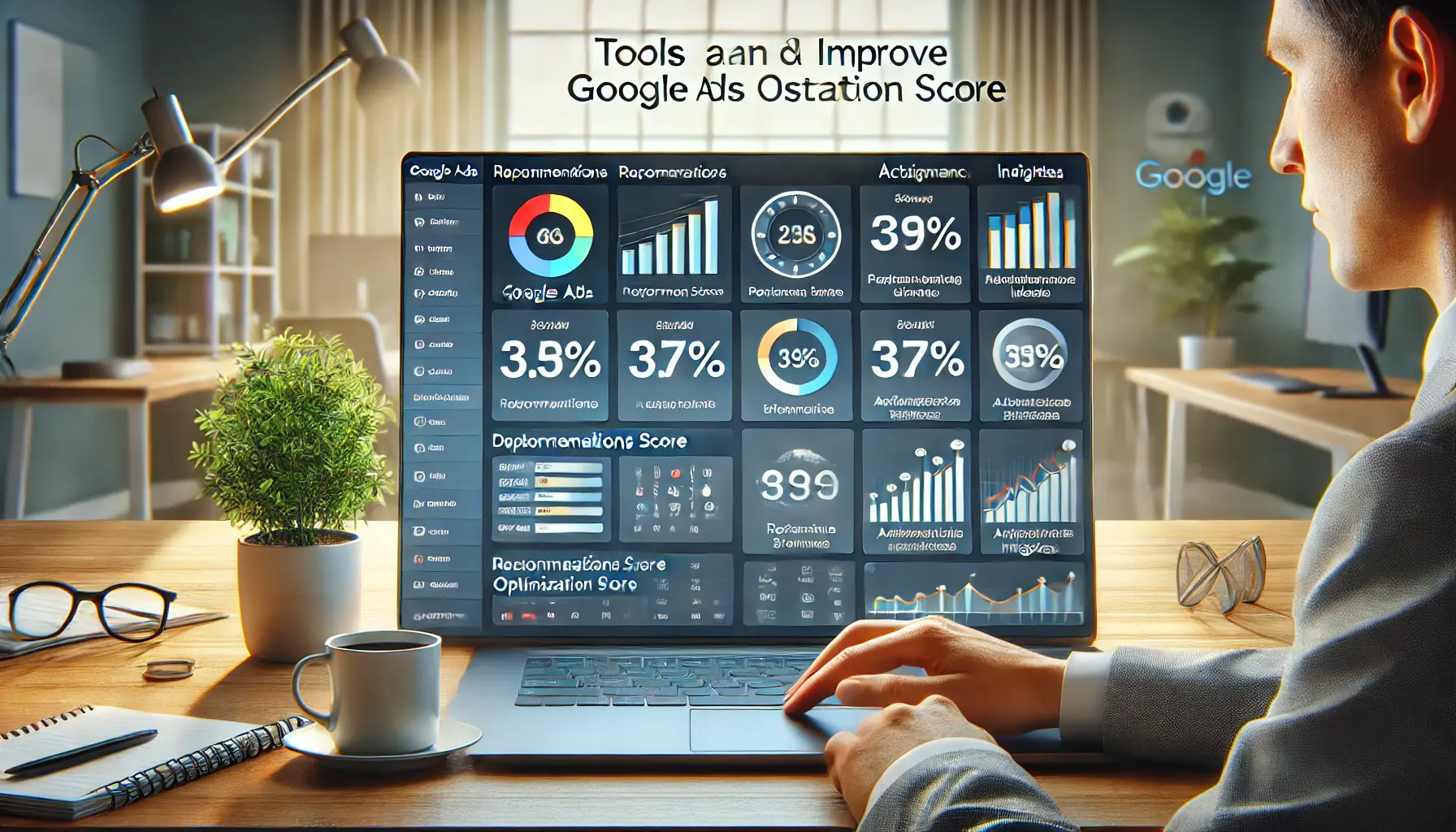
Utilizing tools: A business professional reviewing Google Ads tools and features to enhance Optimization Score.
Tools and Features to Monitor and Improve Optimization Score
Maintaining a high Optimization Score in Google Ads requires utilizing the right tools and features designed to enhance campaign performance.
Leveraging these resources can provide valuable insights and streamline your optimization efforts.

Optimizing campaigns: A business professional reviewing Google Ads recommendations for improving ad performance.
Google Ads Recommendations
The Recommendations tab in Google Ads offers personalized suggestions to improve your campaigns.
These recommendations are based on your account’s performance history, campaign settings, and recent trends across Google.
- Optimization Score: Provides an estimate of how well your account is set to perform. Implementing the suggested recommendations can help improve this score.
- Actionable Insights: Offers specific recommendations, such as adding new keywords or adjusting bids, to enhance campaign performance.

Forecasting success: A business professional using the Google Ads Performance Planner to optimize budget allocation and forecast campaign performance.
Performance Planner
The Performance PlannerA tool in Google Ads that forecasts the potential impact of budget and bid adjustments on campaign performance. is a forecasting tool that helps you understand how changes to campaigns can impact key metrics and overall performance.
- Budget Optimization: Helps allocate budgets effectively across campaigns for improved results from your marketing spend.
- Performance Forecasts: Provides projections of potential outcomes based on various spending scenarios.
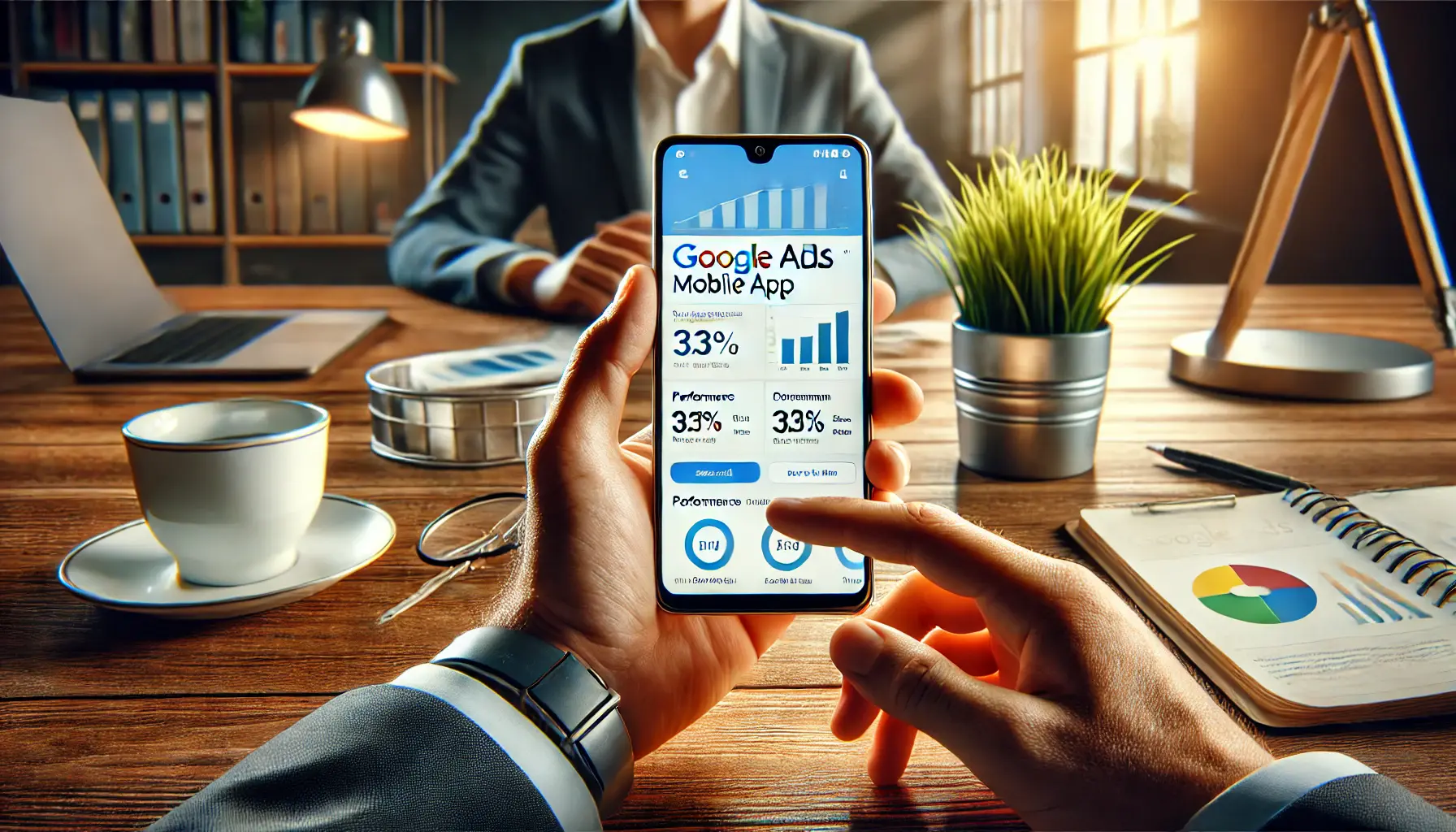
Managing on the go: A business professional using the Google Ads Mobile App to track campaign performance from their smartphone.
Google Ads Mobile App
The Google Ads Mobile App allows you to monitor and manage your campaigns on the go, ensuring you can make timely adjustments as needed.
- Real-Time Monitoring: Access up-to-date performance metrics to stay informed about your campaigns.
- Quick Actions: Implement changes, such as pausing ads or adjusting budgets, directly from your mobile device.

Efficient campaign management: A business professional using the Google Ads Editor to optimize and manage ad campaigns in bulk.
Google Ads Editor
The Google Ads EditorA downloadable application that allows bulk edits and offline management of Google Ads campaigns. is a downloadable application that enables you to manage your campaigns offline and make bulk changes efficiently.
- Bulk Edits: Make large-scale changes across several campaigns in minutes.
- Offline Access: Work on your campaigns offline and upload changes when ready.

Optimizing ad performance: A business professional analyzing integrated data from Google Ads and Google Analytics to improve campaign results.
Integration with Google Analytics
Linking your Google Ads account with Google AnalyticsA web analytics tool by Google used to track and report website traffic and user behavior. provides deeper insights into user behavior and campaign performance.
- Comprehensive Reporting: Analyze user interactions post-click to assess campaign effectiveness.
- Enhanced Conversion Tracking: Monitor goals and e-commerce transactions to measure ROI accurately.
By utilizing these tools and features, you can effectively track and improve your Optimization Score, enabling more successful and efficient Google Ads campaigns.
Leverage tools like the Google Ads Recommendations tab, Performance Planner, and Google Analytics integration to effectively monitor and enhance your Optimization Score.

Optimizing performance: A business professional analyzing metrics and insights to maintain a high Optimization Score in Google Ads.
Best Practices for Maintaining a High Optimization Score
Achieving a high Optimization Score in Google Ads is a significant milestone, but maintaining it requires ongoing effort and strategic management.
Consistent adherence to best practices ensures your campaigns remain effective and aligned with Google’s standards.

Improving performance: A business professional regularly reviewing and implementing Google Ads recommendations to optimize campaigns.
Regularly Review and Implement Recommendations
Google Ads provides personalized recommendations to enhance your campaign performance.
Regularly reviewing and implementing these suggestions can help maintain a high Optimization Score.
- Stay Updated: Regularly visit the Recommendations tab to identify new opportunities for improvement.
- Prioritize Actions: Focus on recommendations with the highest potential impact on your campaign goals.

Creating impactful ads: A business professional working to maintain high-quality ad content for Google Ads campaigns.
Maintain High-Quality Ad Content
The relevance and appeal of your ad content play a vital role in consistently maintaining a high Optimization Score.
- Ad Relevance: Ensure your ad copy is aligned with targeted keywords to improve Quality Scores.
- Compelling Creatives: Write clear and persuasive ad copy to attract user engagement.

Optimizing campaigns: A business professional reviewing budget and bidding strategies to enhance Google Ads performance.
Budget and Bidding Strategy Optimization
Optimizing budget management and bidding strategies is crucial for achieving the best performance from campaigns.
- Smart Bidding: Use automated bidding strategies to maximize results within your allocated budget.
- Budget Allocation: Invest funds wisely across campaigns to ensure efficient use of resources.

Optimizing campaigns: A business professional updating keywords and targeting settings to improve Google Ads performance.
Update Keywords and Targeting Regularly
Keeping your keywords and targeting parameters up to date ensures your ads reach the most relevant audience.
- Keyword Management: Add new relevant keywords and remove underperforming ones to enhance campaign effectiveness.
- Audience Refinement: Adjust targeting settings based on performance data to reach the most responsive users.

Tracking success: A business professional monitoring key campaign performance metrics in Google Ads.
Monitor Campaign Performance Metrics
Consistent monitoring of key performance indicators (KPIs) helps in making informed decisions to maintain a high Optimization Score.
- Performance Analysis: Routinely analyze metrics such as CTR, conversion rates, and Quality Scores to assess campaign health.
- Data-Driven Adjustments: Use performance data to make informed changes, enabling ongoing campaign optimization.
By following these best practices, you can ensure a high Optimization Score, keeping your Google Ads campaigns effective and aligned with industry standards.
Consistently review recommendations, maintain high-quality ad content, and monitor key performance metrics to sustain a high Optimization Score over time.
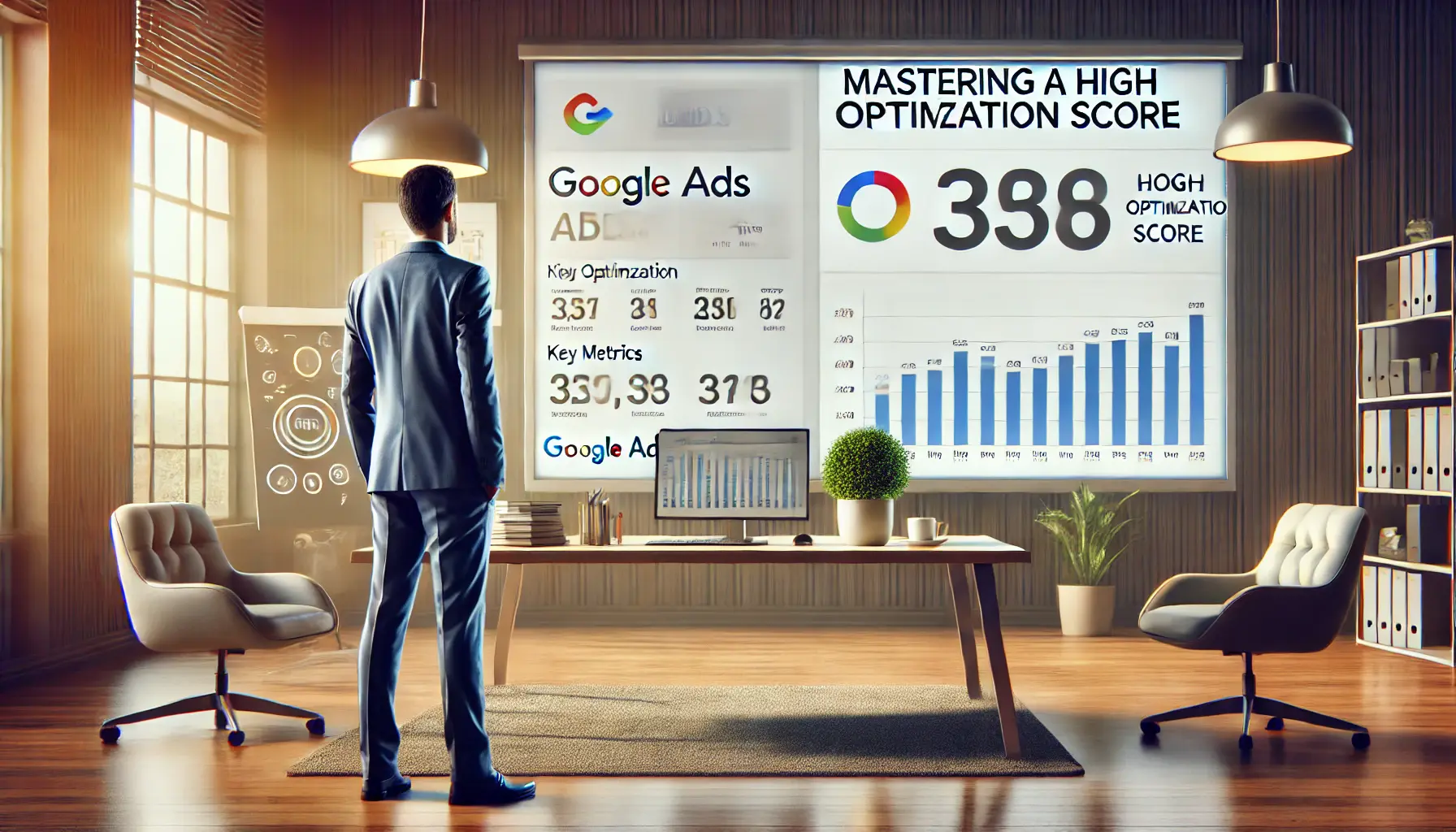
Mastering optimization: A business professional reviewing key metrics on a screen, symbolizing the achievement of a high Optimization Score in Google Ads.
Conclusion: Mastering the Art of a High Optimization Score
A high Optimization Score is not just a metric but a comprehensive reflection of the health and effectiveness of your Google Ads campaigns.
Achieving and maintaining this score requires consistent effort, strategic planning, and leveraging the right tools and features.
By understanding its importance, you can unlock the full potential of your advertising efforts.

Reflecting on insights: A business professional reviewing key takeaways and summarized data from a Google Ads campaign analysis.
Key Takeaways from the Article
Here is a summary of the key strategies and takeaways discussed:
- Understanding the Optimization Score: Learn how Google calculates it and why it is crucial for campaign success.
- Improving Your Optimization Score: Focus on creating quality ad content, utilizing responsive search ads, and optimizing budget and targeting settings.
- Overcoming Challenges: Address issues such as low keyword quality scores, budget mismanagement, and seasonal fluctuations to sustain high performance.
- Leveraging Tools and Features: Use resources like the Recommendations tab, Performance Planner, and Google Ads Editor to monitor and refine your campaigns effectively.
- Following Best Practices: Regularly update keywords, refine targeting, and monitor performance metrics to keep campaigns aligned with industry standards.
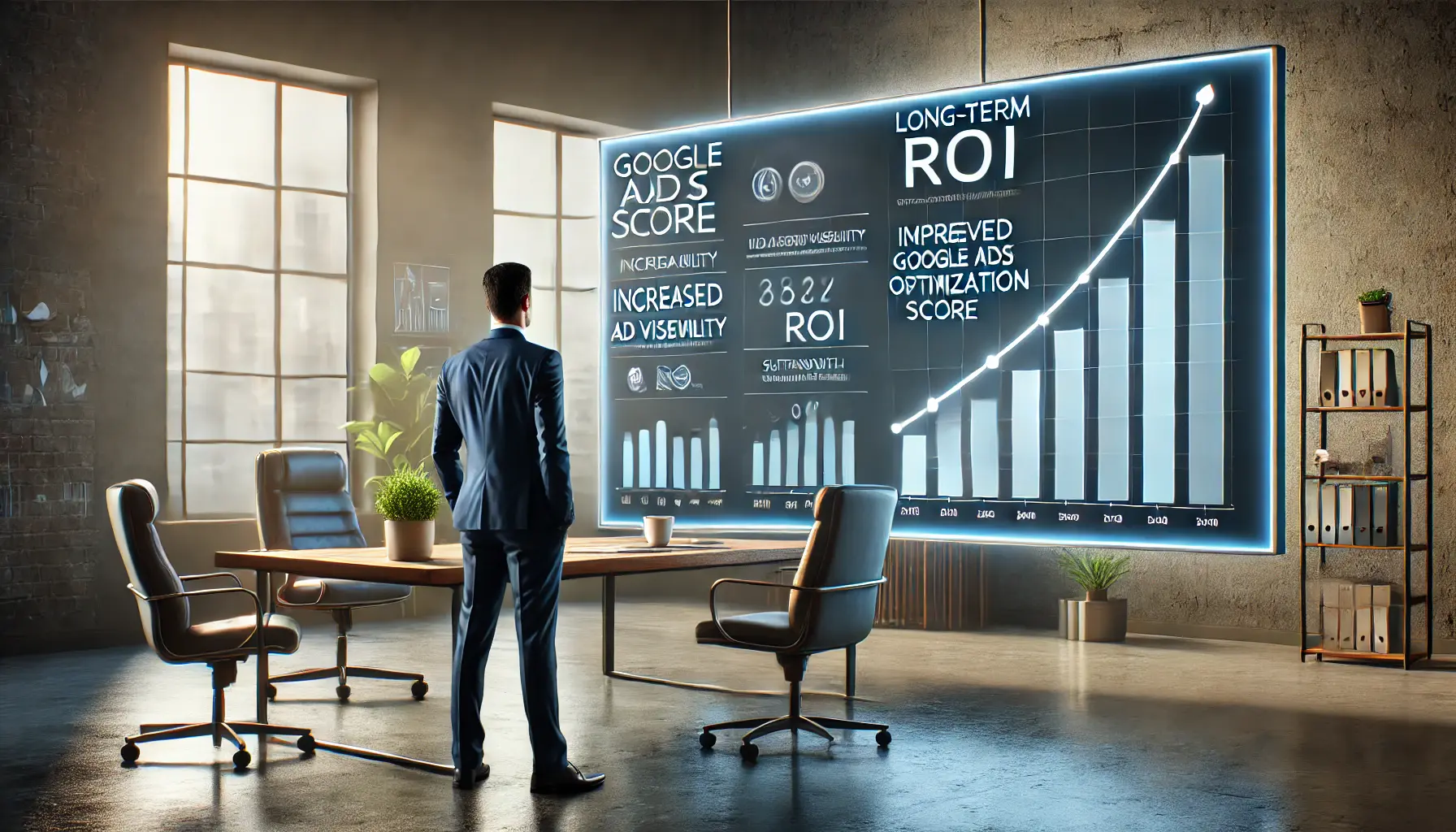
Achieving sustained success: A business professional reviewing the long-term benefits of a high Optimization Score in Google Ads.
Long-Term Benefits of a High Optimization Score
Maintaining a high Optimization Score provides several long-term benefits, including:
- Increased ad visibility and higher click-through rates.
- Improved return on investment (ROI), ensuring your ad spend generates valuable results.
- Enhanced campaign performance with more engaged and responsive users.

Achieving success: A business professional reviewing the upward trajectory of performance metrics and optimization scores in Google Ads.
Your Pathway to Success
The good news is that with the strategies and tools discussed in this article, you have the ability to not only achieve but also sustain a high Optimization Score.
Stay proactive by regularly reviewing your campaigns against trends and evolving recommendations, and always be prepared to adapt.
Success on Google Ads is not just a one-time goal; it is an ongoing process of improvement and refinement.
With dedication and the right approach, your advertising campaigns can consistently deliver the results you desire, ensuring your business reaches its objectives and achieves lasting success.
Maintaining a high Optimization Score is an ongoing process that requires strategic planning, regular updates, and leveraging advanced tools to achieve long-term success in Google Ads campaigns.
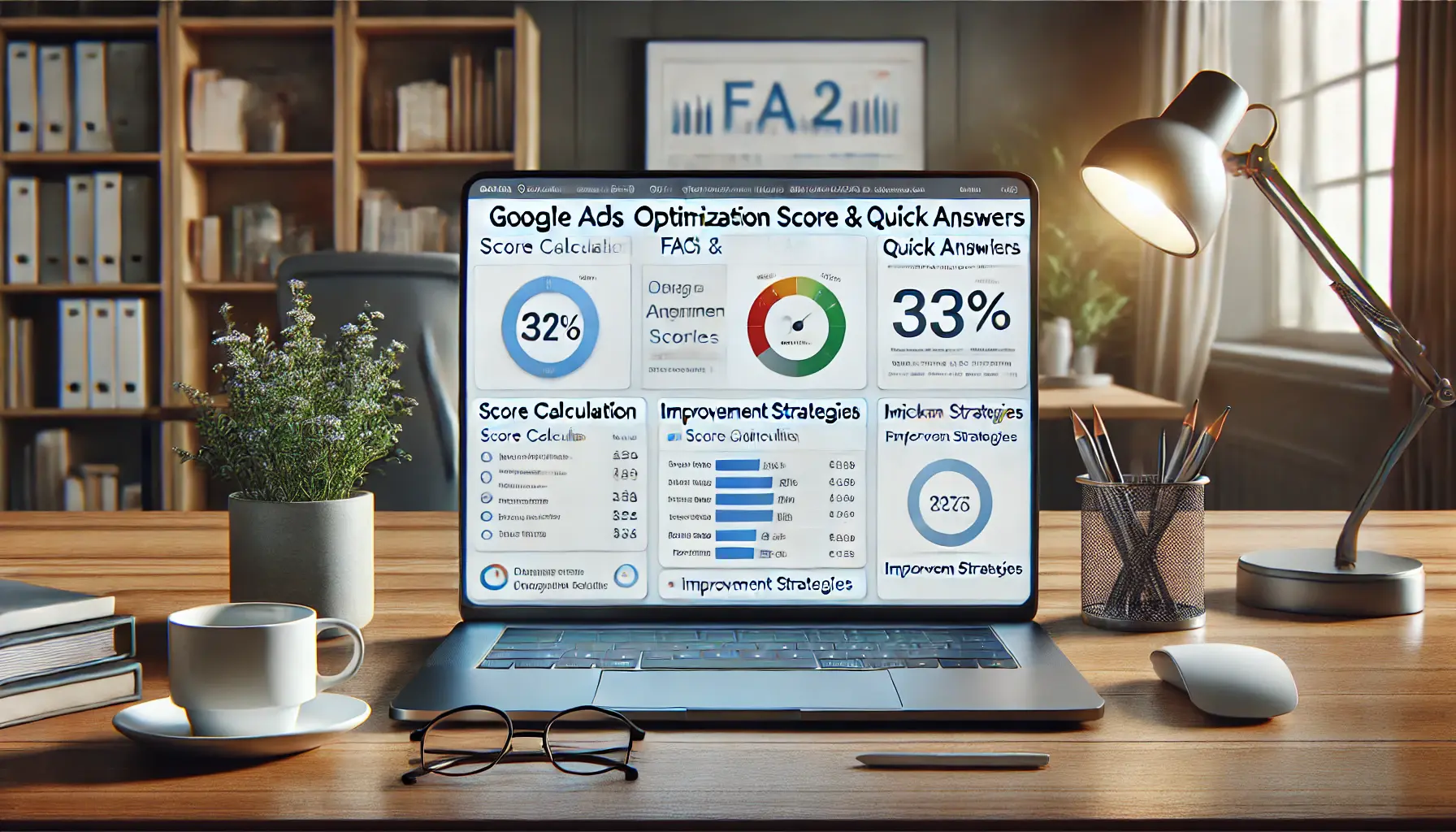
Understanding optimization: A business professional reviewing quick answers and FAQs related to Google Ads Optimization Score.
Your campaigns can be managed by an agency specialized in Google Ads, check out our service page.
Google Ads Optimization Score: FAQs and Quick Answers
Understand Google Ads Optimization Score better with these common questions and short answers.
It is a percentage ranging from 0% to 100%, showing the effectiveness of your Google Ads account setup.
A score of 100% indicates optimal performance.
Google calculates it in real-time based on your account statistics, settings, and campaign performance.
Though a high score suggests alignment with best practices, actual performance depends on factors like ad relevance and audience targeting.
Yes, if you apply all recommendations by Google.
However, ensure they align with your business objectives.
No, Optimization Score assesses overall account performance, whereas Quality Score measures the relevance and quality of keywords and ads.
Regularly, especially after implementing significant changes in your campaigns or website.
Not necessarily.
Focus on recommendations aligned with your goals and those with the most significant impact.
Indirectly, as a higher score often signals better-optimized campaigns, potentially improving ad rank and performance.
New recommendations, changes in account settings, or shifts in campaign performance can cause fluctuations in your score.


